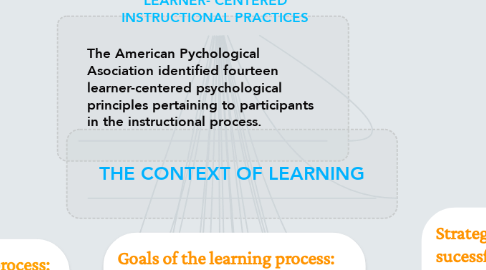LEARNER- CENTERED INSTRUCTIONAL PRACTICES
저자: KAREN DANIELA TEJADA LOPEZ

1. The American Pychological Asociation identified fourteen learner-centered psychological principles pertaining to participants in the instructional process.
2. THE CONTEXT OF LEARNING
3. Nature of the learning process: succesful learners construct meaning from information and experience.
4. Goals of the learning process: setting and pursuing goals that are personally meaningful provides and important foundation for learning.
5. Thinking about thinking: Both critical and creative thinking skills play a role in the learning process.
6. Contex of learning: the setting or context in wich learning occurs can enhance or detract from learning.
7. MOTIVATIONAL AND AFFECTIVE FACTORS
8. Motivational and Emotional influences on learning: learners beliefs about themselves, as well as their internal motivation, play a significant role in learner success.
9. DEVELOPMENTAL AND SOCIAL FACTORS
10. Developmental influences on learning: individuals learn best when educators or trainers take into account the intellectual,emotional,and characteristics of the learner.
11. INDIVIDUAL DIFFERENCES
12. Individual differences in learning: attention to individual learning styles promotes a continuing desire to learn and an interest in the learning activities
13. Strategic thinking: sucessful learners create and use a variety of thinking and reasoning strategies,
14. Construction of knowledge: the ability to relate nwe information to existing knowledge promotes interest in continuing the learning process.
15. Instrinsic motivation to learn: Creativity and curiosity of the learner contribute to the laerners continuing interest in the pursuit of knowledge and skills.
16. Effects of motivation on effort : the willingness to put forth effort in order to master a subject indicates motivation to learn.
17. Social influences on learning: interpersonal interactions also infuence learning success.
18. Learning and diversity: any group of individuals includes diversity in the form of ethnic,racial,linguistic, and social backgrounds.
19. Standards and assessment: ongoing assessment of individual achievement and progress provides important feedback to learners.


